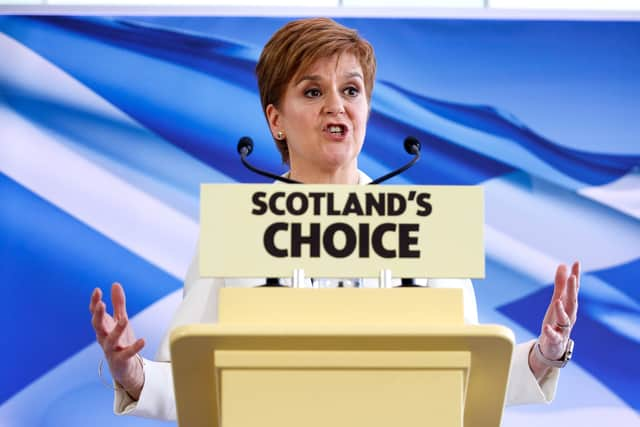Will there be another Scottish independence referendum? Nicola Sturgeon’s plans explained - polls latest
and live on Freeview channel 276
Eight years after Scotland chose to stay in the United Kingdom by the finest of margins, Nicola Sturgeon and the SNP have launched their campaign to hold a second referendum.
The political party launched its fresh campaign to leave the United Kingdom after saying the Scottish people had given an “indisputable mandate” to do so.
Advertisement
Hide AdAdvertisement
Hide AdParty leader and Scottish First Minister Nicola Sturgeon unveiled the newest plans for a “a different and better vision” for Scotland on Tuesday 14 June in a series of papers detailing the arguments for leaving the UK.
But opposition parties have accused the SNP of being obsessed with its pursuit of independence, and the UK Government signalled that it would not give permission for a second referendum to be held.
So will there actually be a vote? And what are the current polls saying about Scotland’s perference for independence?


Will there be a second Scottish Independence referendum?
Indyref2 has been a phrase bandied about since the results of the 2014 referendum were revealed.
Advertisement
Hide AdAdvertisement
Hide AdIt became more prominent after the Brexit vote in 2016 - 64% of Scottish voters voted to stay in the EU despite the UK-wide vote meaning that the country as a whole left the European Union.
But the reality could be closer now more than ever.
Ms Sturgeon and her party have campaigned throughout the past few years throughout general elections and Scottish elections, often with a focus on pursuing another vote on independence.
The last independence referendum saw Scots voting to stay in the union with 55% in favour, while 45% voted to leave.
The SNP has regularly returned strong election results in Scotland, with the party stating this has given the party an “indisputable mandate” to push forward with a second referendum.
Advertisement
Hide AdAdvertisement
Hide AdHowever, the UK Government does not agree that now is the time for another vote on Scotland’s future.
UK Prime Minister Boris Johnson has argued the 2014 referendum was a “once-in-a-lifetime” opportunity, adding that another vote should not be held for at least 40 years.
Ms Sturgeon has, however, promised to “forge a way forward, if necessary without a section 30 order”.
What is a section 30 order?
As part of the 2014 referendum, the Scottish Government formally requested a section 30 order from the UK Government to allow them to be given the power to hold the vote in the first place.
Advertisement
Hide AdAdvertisement
Hide AdThe order exists under the Scotland Act 1998 and allows for the Scottish Government to increase or restrict its legislative powers if granted by the UK Government.
The Scottish Government had already reuqested a section 30 order in 2017 as it attempted to hold a second referndum, but the UK Government refused to grant this. This was then renewed in 2019, with a view to holding the vote in the near future.
What has Nicola Sturgeon said about a second Scottish independence referendum?
Upon unveiling the SNP’s series of papers for a fresh independence campaign - titled ‘Independence in the modern world. Wealthier, happier, fairer: why not Scotland?’ - Ms Sturgeon said the Scottish Government’s power to hold the vote was “contested”.
However the First Minister added that the UK Government should recognise the role of democracy in allowing the country to hold the referendum once more.
Advertisement
Hide AdAdvertisement
Hide AdShe said: “If this UK government had any respect at all for democracy, the issue of legality would be put beyond doubt, as in 2014.”
Ms Sturgeon said that she was “ready to dicuss the terms of such an order at any time” with Mr Johnson, but added that the SNP “must forge a way forward if necessary without a section 30 order.”
The First Minister said Scottish independence from the UK would put “the levers that determine success into our own hands” and that Westminster was taking Scotland “in the wrong direction”.
When will a second Scottish independence referendum be held?
Ms Sturgeon confirmed on 28 June 2022 that the SNP have decided on a date on which the proposed referendum could take place.
Advertisement
Hide AdAdvertisement
Hide AdThe Sccotish Government is seeking to hold the vote on 19 October 2023.
This timeline may be altered though if the SNP are not given a section 30 order and a legal vote cannot take place.
Likewise, if legal action is taken against the government’s proposed bill, this will also alter the timeline.
During the announcement, the First Minister urged the UK Government to avoid any delays to the vote, and to recognise the “mandate” given to them by the Scottish public.
What do the polls say about Scottish independence?
Advertisement
Hide AdAdvertisement
Hide AdThe preference of the Scottish poulation to leave the UK remains as close as ever, according to recent polling.
A YouGov poll from 23 May showed that 45% of recipients would vote Yes (to leave the United Kingdom) and 55% of recipients would vote No (to stay in the United Kingdom), echoing the results of the 2014 vote.
An Ipsos Mori poll from 31 May showed the result would be evenly split at 50% to 50%.
The Yes campaign has seen fluctuations in support over the past few years, being boosted in the polls following events such as the Brexit vote and Mr Johnson being elected Prime Minister of the UK.
The support reached the highest levels in the polls in November 2020, when it reached 56%.
Comment Guidelines
National World encourages reader discussion on our stories. User feedback, insights and back-and-forth exchanges add a rich layer of context to reporting. Please review our Community Guidelines before commenting.
